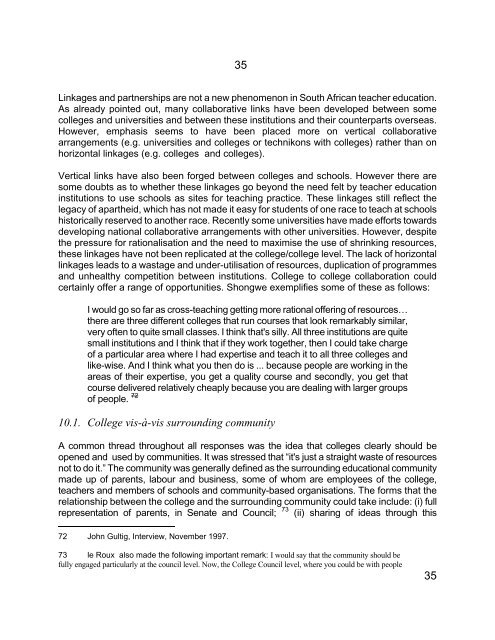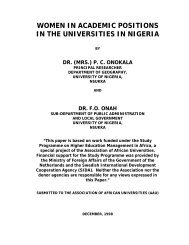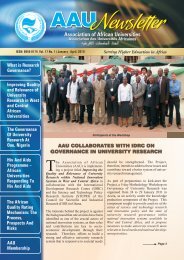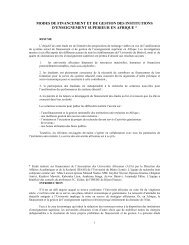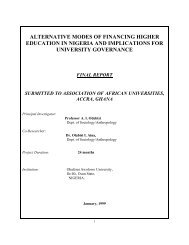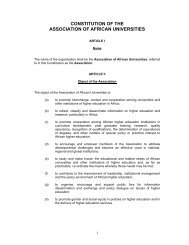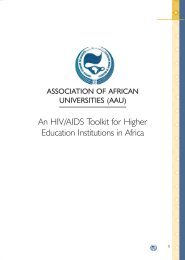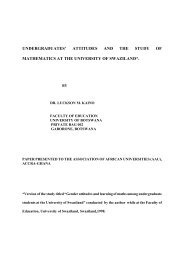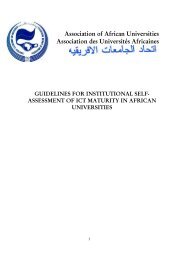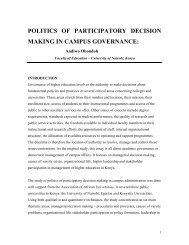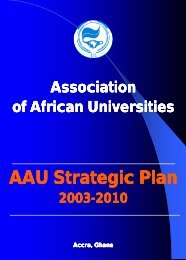governing teacher education colleges in south africa
governing teacher education colleges in south africa
governing teacher education colleges in south africa
You also want an ePaper? Increase the reach of your titles
YUMPU automatically turns print PDFs into web optimized ePapers that Google loves.
35<br />
L<strong>in</strong>kages and partnerships are not a new phenomenon <strong>in</strong> South African <strong>teacher</strong> <strong>education</strong>.<br />
As already po<strong>in</strong>ted out, many collaborative l<strong>in</strong>ks have been developed between some<br />
<strong>colleges</strong> and universities and between these <strong>in</strong>stitutions and their counterparts overseas.<br />
However, emphasis seems to have been placed more on vertical collaborative<br />
arrangements (e.g. universities and <strong>colleges</strong> or technikons with <strong>colleges</strong>) rather than on<br />
horizontal l<strong>in</strong>kages (e.g. <strong>colleges</strong> and <strong>colleges</strong>).<br />
Vertical l<strong>in</strong>ks have also been forged between <strong>colleges</strong> and schools. However there are<br />
some doubts as to whether these l<strong>in</strong>kages go beyond the need felt by <strong>teacher</strong> <strong>education</strong><br />
<strong>in</strong>stitutions to use schools as sites for teach<strong>in</strong>g practice. These l<strong>in</strong>kages still reflect the<br />
legacy of apartheid, which has not made it easy for students of one race to teach at schools<br />
historically reserved to another race. Recently some universities have made efforts towards<br />
develop<strong>in</strong>g national collaborative arrangements with other universities. However, despite<br />
the pressure for rationalisation and the need to maximise the use of shr<strong>in</strong>k<strong>in</strong>g resources,<br />
these l<strong>in</strong>kages have not been replicated at the college/college level. The lack of horizontal<br />
l<strong>in</strong>kages leads to a wastage and under-utilisation of resources, duplication of programmes<br />
and unhealthy competition between <strong>in</strong>stitutions. College to college collaboration could<br />
certa<strong>in</strong>ly offer a range of opportunities. Shongwe exemplifies some of these as follows:<br />
I would go so far as cross-teach<strong>in</strong>g gett<strong>in</strong>g more rational offer<strong>in</strong>g of resources…<br />
there are three different <strong>colleges</strong> that run courses that look remarkably similar,<br />
very often to quite small classes. I th<strong>in</strong>k that's silly. All three <strong>in</strong>stitutions are quite<br />
small <strong>in</strong>stitutions and I th<strong>in</strong>k that if they work together, then I could take charge<br />
of a particular area where I had expertise and teach it to all three <strong>colleges</strong> and<br />
like-wise. And I th<strong>in</strong>k what you then do is ... because people are work<strong>in</strong>g <strong>in</strong> the<br />
areas of their expertise, you get a quality course and secondly, you get that<br />
course delivered relatively cheaply because you are deal<strong>in</strong>g with larger groups<br />
of people. 72<br />
10.1. College vis-à-vis surround<strong>in</strong>g community<br />
A common thread throughout all responses was the idea that <strong>colleges</strong> clearly should be<br />
opened and used by communities. It was stressed that “it's just a straight waste of resources<br />
not to do it.” The community was generally def<strong>in</strong>ed as the surround<strong>in</strong>g <strong>education</strong>al community<br />
made up of parents, labour and bus<strong>in</strong>ess, some of whom are employees of the college,<br />
<strong>teacher</strong>s and members of schools and community-based organisations. The forms that the<br />
relationship between the college and the surround<strong>in</strong>g community could take <strong>in</strong>clude: (i) full<br />
representation of parents, <strong>in</strong> Senate and Council; 73 (ii) shar<strong>in</strong>g of ideas through this<br />
72 John Gultig, Interview, November 1997.<br />
73 le Roux also made the follow<strong>in</strong>g important remark: I would say that the community should be<br />
fully engaged particularly at the council level. Now, the College Council level, where you could be with people<br />
35


